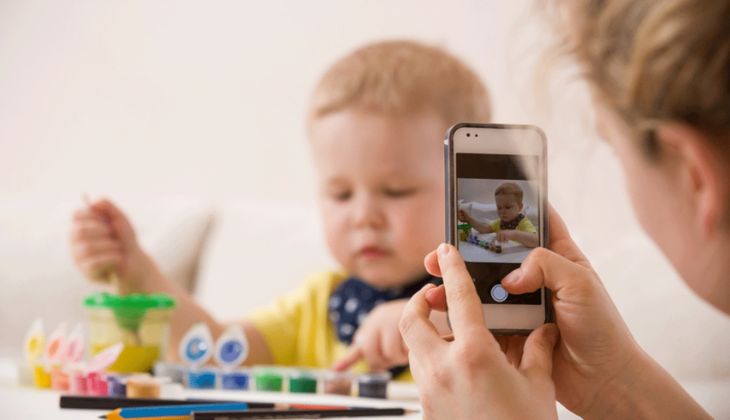Nowadays we live surrounded by mobile devices that have become an extension of our limbs. And naturally this has certain consequences. Smartphones and their widespread popularity, along with such frequent use of social networks among new generations, have given rise to a practice as common as it is dangerous: sharenting. What is it and what kind of risks does it entail for families? Find out in this article.
Sharenting: definition and rise
The interactive dimension of social networks is undeniable. In a world largely conditioned by images, where what is not seen does not seem to exist, social networks occupy a vast, irreplaceable space in many people’s lives. Sharenting – a portmanteau of “sharing” and “parenting” – is the act of revealing one’s private life on social networks so as to show the world a certain image of the day-to-day life of the person posting the content and their children (which may include photos, videos, data and/or sentimental statements).

Sharenting may well have a meaning closely linked to one’s ego and the need for approval, given what it represents. Although more and more people are becoming aware how important it is to be cautious about what they publish, there are still families who do not see it like that. Parents’ actions are particularly relevant in this regard, as it is often parents themselves who end up revealing aspects of their children’s personal lives that they should not disclose.
Whether out of ignorance or bad faith, overexposing one’s life on social media is a practice that has exploded with the emergence of various platforms. What started with small posts on Facebook back in 2004 has only multiplied thanks to Instagram, Snapchat, TikTok and new formats for publishing images and short videos through stories (the name already implies that they constitute an exposition of life in the form of continuous stories).
The risks of publicising one’s private life on networks
Posting photos of children, for example, may compromise their safety in some way. The Internet has as many advantages as it has risks. Postings on social networks give criminals and dishonest people information about the school where the children study, about their behaviour, about the places and times when a family is on holiday (which may encourage criminals or burglars to rob their usual home because they know that no one is in) and so on.
In short, sharenting fosters a flow of information that, even if it is posted on networks with the best of intentions, can end up being used for countless negative activities. And if an adult can disclose and publicise their life as they see fit, they should not do the same with the lives of children, who are unaware of what is involved and in most cases are not informed or consulted about the implications of this practice.
 Source: Airedigital
Source: Airedigital
How to manage in the information society: 6 tips
Sharenting, therefore, may involve violation of children’s rights to self-image, privacy and intimacy with future consequences. In order to deal with the information society in a safer, more conscious way, parents can follow these tips:
- Limit the use of social networks and overexposure to them – of both yourself and your kids.
- Check and strengthen your privacy settings on your various network profiles.
- Regularly filter and sanitise your list of contacts and friends on social networks, as it is these contacts who will have access to the photos and information you post. As far as possible, refuse friend requests from strangers.
- Avoid publishing the locations and images of children, especially in intimate or private moments (with little or no clothing, for example).
- Discourage the disclosure of data such as addresses, names or identities on social media.
Now you know more about sharenting, what it is and how you can minimise the associated risks. Remember that in the information society in which we live, a person’s (and especially children’s) data and images can impact their future personal and working life. Make sure you reduce your online exposure and allow caution to creep into your life, enjoying leisure time with your children in paradises like the Costa del Sol in the safest, most intimate way possible!







